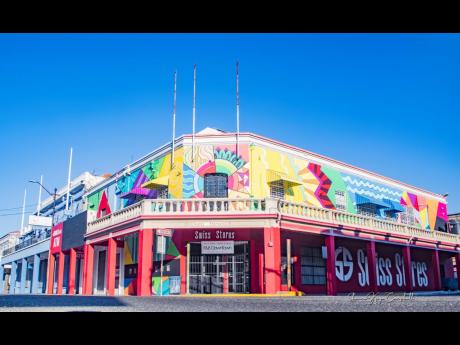Drive on to formalise creative businesses
The Inter-American Development Bank is backing an initiative to bring creative ventures out of the shadows through its innovation unit, IDB Lab, which is working alongside Kingston Creative Limited and two government agencies on a registration...
The Inter-American Development Bank is backing an initiative to bring creative ventures out of the shadows through its innovation unit, IDB Lab, which is working alongside Kingston Creative Limited and two government agencies on a registration drive.
The so-called The CreaTech Entrepreneur Development Programme did not begin with that focus. It started as an initiative of Kingston Creative Limited and IDB Lab to improve the digital and business skills of 1,500 micro and small entrepreneurs, including 300 creative entrepreneurs based in downtown Kingston. The targeted entrepreneurs would then be pointed towards business opportunities in the international market.
But the agenda expanded after groundwork carried out by the two partners showed that many creatives in the industry were shying away from registering their businesses.
In a bid to change that, the two partners brought the Companies Office of Jamaica and Jamaica Intellectual Properties Office ( JIPO) on board.
“We realised that there was a lot of hesitancy in creatives registering their businesses because of concerns around taxation. But in order for these entrepreneurs to benefit from government assistance, international grants and investment capital opportunities, it’s required that they register their business and trademark their intellectual property,” said Keesha Wallace, marketing and communications officer at Kingston Creative.
“And so it was only natural for the programme to evolve and have these new partners involved,” she said.
The CreaTech ‘Make it Official’ drive will seek to both register entrepreneurial ventures as companies and to trade mark their intellectual property.
The registration drive will run until the end of September, and as a sweetener, the first 50 entrepreneurs will each be eligible for a rebate of $12,000, financed under the US$1.295 million ($200 million) CreaTech project.
IDB Lab has contributed US$595,000 ($92 million) towards the project and Kingston Creative has put forward US$$700,000 ($108 million).
On the ground, Kingston Creative, which has made downtown its base of operation since July 2020, has been working with various community-based organisations and non-governmental organisations in Kingston, including those in vulnerable communities such as Trench Town, Rae Town, Greenwich Town, Rose Gardens, and Fletcher’s Land.
As their contribution to the effort, Companies Office and JIPO will allow entrepreneurs to schedule one-on-one office time in which they will be briefed and given the opportunity to ask questions regarding the benefits of becoming a registered entity and registering their trademarks and the requirements of a registered company.
“Many fear the process, but we’ve done the work to make it as streamlined as possible. This includes making it accessible online,” said Kawain Fearon, public relations officer at the Companies Office of Jamaica, in a press release announcing the collaboration.
“Too many opportunities are being missed because entrepreneurs haven’t gone through the proper channels. That’s why we welcomed this opportunity to encourage everyone, especially those operating in the creative and cultural economy, to make it official,” Fearon said.
Newly registered and existing businesses in the cultural industry will be further supported by Kingston Creative and IDB Lab through the CreaTech training sessions and workshops over the next three years.
IDB Lab is backing initiatives like CreaTech to help position low-resource sectors and countries to participate in the opportunities that are emerging internationally and on the Web for creative entrepreneurs, software developers, and designers.
Terry-Ann Segree, IDB Lab’s private finance senior specialist, said in a release from the IDB that what has given rise to these opportunities is the growing global trend of mixing the traditional artistic elements of contemporary art and culture, music, fashion, literature, theatre, dance and film with animation, augmented and virtual reality, 3D printing, science, gaming, and software.
The COVID-19 Economic Recovery Task Force last year estimated the value of the entertainment, culture, and creative industries at $84 billion, a figure that excluded economic activity generated from intangibles such as trademarks, music, catalogues, and images.
State marketing agency JAMPRO has long had a programme to promote Jamaican creatives in the export market by matching foreign investors with local talent and assets. But the process has been slow, due in part to the reluctance of the entrepreneurs to register their businesses.
“The formalisation of companies in these priority creative sectors is a crucial step towards sustainable industries, and this drive, as part of a larger ecosystem of initiatives, will help to normalise this process,” said Jampro Film Commissioner Renée Robinson.
“I know that many creatives are hesitant towards this step, but if there is one thing that we consistently see – from facilitating clients of all sizes both locally and internationally – it is that the adoption of a viable business structure is a catalyst to success. Registration demonstrates readiness, which results in access to opportunities,” she told the Financial Gleaner.
Jamaica has a large informal sector that at one time was estimated at 40 per cent and is still the statistic used to quantify the grouping. But recently, there have been fresh initiatives to entice informal operators into the formal economy, including the CreaTech drive.
The most overt programme was signed last year between the Government of Jamaica and the UN International Labour Organization – a 15-month formalisation project to shift businesses and workers in the agricultural, fisheries, and domestic services into the formal economy.
Registrations and other activity have commenced regarding the first two. However, the domestic services representative said on Thursday that they are still in talks with the formalisation project leaders regarding technical and financial assistance to assist with the shifting of that sector into the formal economy.

